Storm slams US South, at least 6 died
Updated: 2014-02-13 10:06
(Agencies)
|
||||||||
ATLANTA - A deadly winter storm potentially more destructive than the one that paralyzed Atlanta just two weeks ago gripped the southern United States on Wednesday, crippling travel, knocking out power to more than 330,000 customers and encasing magnolia trees and palmetto fronds in ice.
|
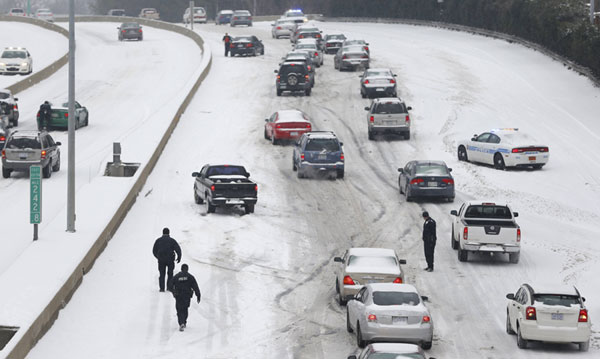 |
|
Charlotte Mecklenburg Police Officers work to assist motorists as they attempt to drive up a hill that is covered in snow in Charlotte, North Carolina February 12, 2014. [Photo/Agencies] |
The weather was blamed for at least 10 deaths throughout the region, including three who were killed when an ambulance transporting a patient skidded off an icy road in Carlsbad, Texas, about 240 miles (386 km) southwest of Dallas, the Texas Department of Public Safety said on Wednesday.
Road conditions quickly deteriorated in South Carolina and North Carolina on Wednesday afternoon, creating a nightmarish commute for drivers in a hurry to get home as the snowfall got heavier and the ice thickened.
Traffic in many places came to a standstill, vehicles skidded off slippery roads and emergency officials urged drivers not to abandon their vehicles, a scenario reminiscent of the messy commute during the storm in Atlanta last month.
Sam Bellezza, a high school teacher who lives in Raleigh, was headed to Home Depot for supplies. It started snowing while he was there and the drive home, which normally takes 10 minutes, took more than two hours, he said.
Some people left their cars behind and were walking along the snowy banks, Bellezza said.
"All these cars were wrecking and falling into a ditch," he said. "It was all bumper cars and people yelling and screaming at one another."
Fatal road accidents also were reported in Mississippi and South Carolina.
More than 3,300 US flights were canceled and about 2,000 delayed on Wednesday, according to flight-tracking website FlightAware.com. Hardest hit were Hartsfield-Jackson International Airport in Atlanta and Charlotte Douglas International Airport in North Carolina.
As the storm moved north, some public transportation in Washington, D.C., including service for disabled riders, was canceled by mid-afternoon on Wednesday. Philadelphia announced that public and parochial schools, as well as all state courts, would be closed on Thursday.
Hundreds of schools across the South, perhaps heeding lessons learned in the last storm, which trapped 11,000 students overnight in Alabama, announced they would be closed Wednesday and Thursday.
In Georgia, state employees on Tuesday made a trip to the Georgia Academy for the Blind in Macon, about 83 miles (133 km) southeast of Atlanta, to pick up four students who had no way to get home, said Governor Nathan Deal.
GEORGIA ROADS EMPTY
Most motorists in Georgia, where thousands were stranded in their vehicles during the last weather front, stayed off the roads after a state of emergency was declared, Deal said. Vehicles that did venture out were soon coated with ice, their radio antennas looking like skewers of ice cubes, television images showed.
A possibly historic accumulation of ice as well as heavy snow was expected to add up to nearly 8 inches of white stuff for Charlotte, and 9 inches forecast for Spartanburg, South Carolina, meteorologists said.
The worsening storm stretched from Mississippi to the Carolinas, and was likely to intensify Wednesday evening as it moved up the East Coast into the northern states, the National Weather Service said.
More than an inch of ice was possible from central Georgia into South Carolina by Thursday morning, according to forecasters.
"Oh, Lord. It's pretty slick out there," said Fred Neely, 69, a retiree living in Florence, South Carolina.
Heavy ice and snow toppled trees onto power lines, cutting off electricity to more than 334,000 customers shivering in a region accustomed to mild winters. More than a third of them were in Georgia, where some residents may have to wait up to a week for power to be restored, said Georgia Power spokeswoman Amy Fink.
"It does appear that the storm could have an even greater impact than we originally had predicted," Fink said.
Shelters were opened in Georgia, Alabama and North Carolina to help those stranded by the storm.
The brutal weather was some of the worst seen in the region in a decade or more.
The last significant ice storm in Georgia was in January 2000, when up to half an inch (1.3 cm) of ice left more than 350,000 people without power, weather service meteorologist Dan Darbe said.
With the latest storm, "we're talking a much larger area and a much larger amount of ice," he said.
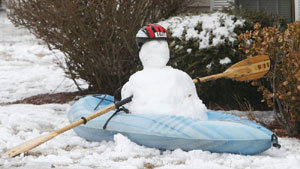 |
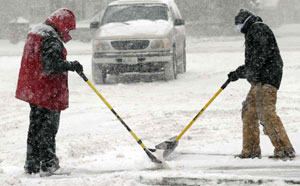 |
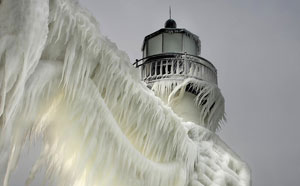 |

 Kids in US reading to cats
Kids in US reading to cats
 Obama raises wage for contract workers
Obama raises wage for contract workers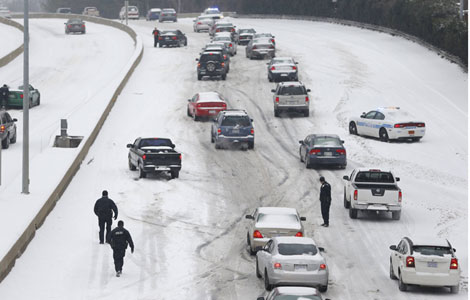
 Deadly ice and snow storm slams US South
Deadly ice and snow storm slams US South
 Starlings to spend the winter in Israel
Starlings to spend the winter in Israel
 Highlights of Singapore Airshow
Highlights of Singapore Airshow
 Sailors of Xuelong release 'love drift bottles'
Sailors of Xuelong release 'love drift bottles'
 Free 3D painting show for Lantern Festival
Free 3D painting show for Lantern Festival
 China takes first Sochi medal on short track
China takes first Sochi medal on short track
Most Viewed
Editor's Picks

|

|

|

|

|
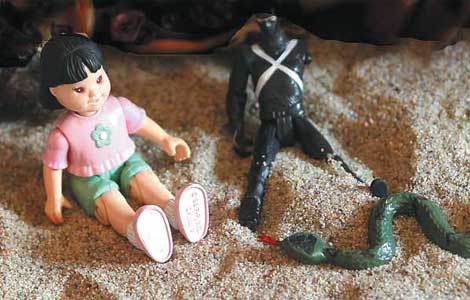
|
Today's Top News
Chinese consume too much food from animals
Obama to visit four Asian countries in April
Jade rabbit comes back to life
Embassy in talks over arrest
Beijing low on list of green cities
No casualties reported in Xinjiang quake
Abe's view on history rapped
Prostitution crackdown expands in Guangdong
US Weekly

|

|





